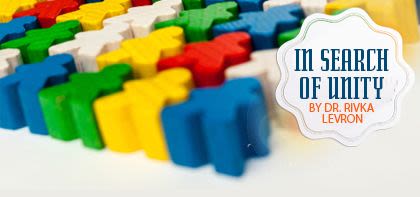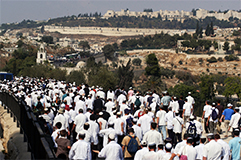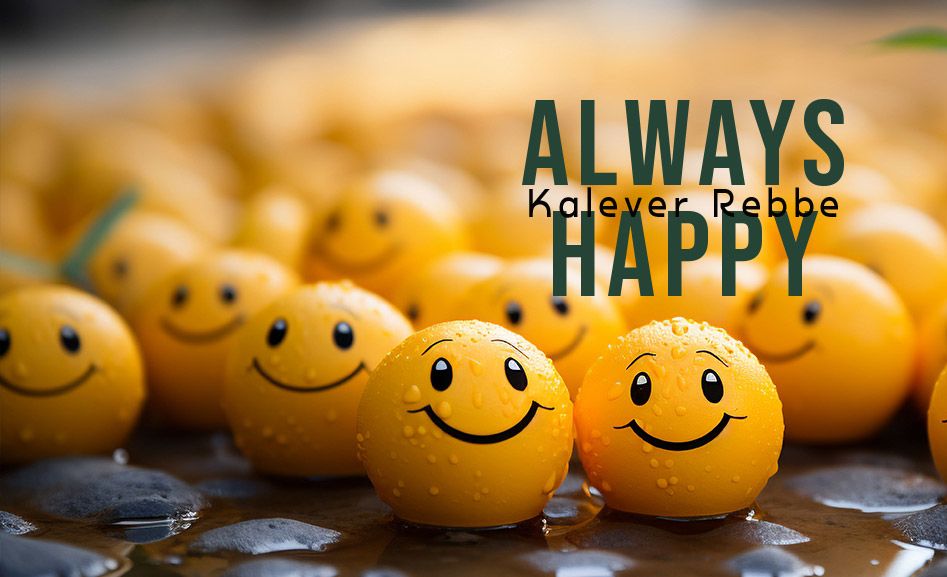
In Search of Unity
The secular view of equality obscures the fascinating and essential differences between men and women. In claiming equal opportunity, it lowers women's status…

Our active holiday erased in a flash. Life called us on another path: our dear grandmother passed away suddenly during the night. The picnic bags with food and camera slumped forgotten in the corner. Instead, we rushed off to the funeral.
We gathered at grandmother’s home to mourn for seven days, more and lesser religious family members together. Questions arose, ones that provoked tough reflections. At such a time, the grief and tension uncover expectations, assumptions about those who live in different ‘boxes’. It can be painful to need unity more than ever – and not find it. But still we try.
Many rules of Jewish practice are not understandable to the human mind. Some are easy to keep, others less so. The laws of mourning can be among the most challenging, for both the non-religious and those used to keeping mitzvot. But we follow them because this is what Hashem wants from us, and we believe it will elevate the soul of the departed loved one.
What about separate seating, and why are women ‘sent to the corner’? My perspective on women’s rights comes from decades of experience in Ivy League universities and the US National Institutes of Health. I’ve worked with many intelligent people. Most of the women have been more capable than their male counterparts. So I don’t necessarily believe men and women are equal. And it goes without saying that we are not identical.
Perhaps unknown to some, Judaism honors women with a respected role. The model for our three daily  prayers, obligatory for men only, was taken from Chana. We learn additional aspects of prayer from Queen Esther as she approached King Achashverosh. And we hear from the Sages that the final redemption will come in the merit of the righteous Jewish women, like the exodus from Egypt thousands of years ago.
prayers, obligatory for men only, was taken from Chana. We learn additional aspects of prayer from Queen Esther as she approached King Achashverosh. And we hear from the Sages that the final redemption will come in the merit of the righteous Jewish women, like the exodus from Egypt thousands of years ago.
The secular view of equality obscures the fascinating and essential differences between men and women. In claiming equal opportunity, it lowers women’s status. This became so clear during the week of shivah, when the wives of the men in mourning pitched in to help in the kitchen. How strange – who even considered that the husbands of the female mourners should likewise give a hand? (!)
To the secular men who suggested that, to ensure equality, every rabbi who speaks at the memorial evening should be followed by a woman speaker: listen – if equality is what you want, next time I’m in the kitchen and you point out a mess on the floor or expect someone to make a salad, maybe you could pick up the broom or knife instead?
Jewish women know how to keep their qualities out of the limelight. Just because these are concealed from public view, doesn’t prevent them from shining brightly in their own setting. We know from the Sages that there is a blessing in that which is hidden. The Torah understands the psychology of men and women much better than we do.
And what’s with religious people’s behavior? Look. We have Hashem and the Torah, which are unchangeable and eternal. And we have us, people who are fallible and whimsical. Each of us entered this world for a specific purpose, with a role only we can fulfill.
Some of us were born into religious families, others not; some even into non-Jewish homes. Whatever our origins, each was given unique strengths to enable us to fulfill our role. And we each have specific deficiencies in our natures we need to fix. Just because a person was born into a religious family, doesn’t mean he or she was endowed with sterling character traits. Logical, right?
But sometimes non-observant Jews assume their religious counterparts, being Hashem’s “representatives” in this world, should be perfect. Perhaps we should be, but often we are not. This is not a reflection of Hashem or the Torah; it shows us where we need to improve.
Thus the week of mourning passed. And yet not only with difficult questions. With heartwarming care, family members said blessings over food, for the elevation of their loved one’s soul. In this and other areas, everyone took care to observe mitzvot in her honor. We were all in agreement with our desire to honor grandmother’s memory in the best way.
In the search for unity, perhaps we raise more issues than these short lines could resolve. We attempt to understand and be in harmony with others in the most trying times. We try our best to do Hashem’s will, even when we don’t understand.
May these efforts give comfort to those who now live in the world of Truth, where everything is clear.







Tell us what you think!
Thank you for your comment!
It will be published after approval by the Editor.